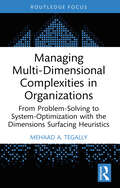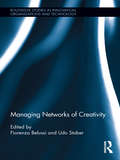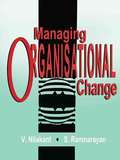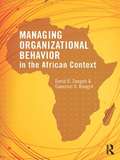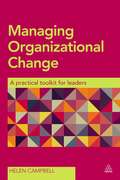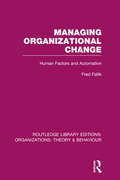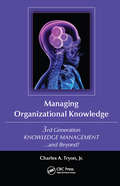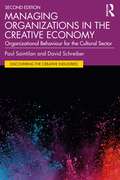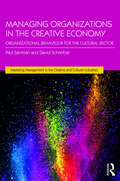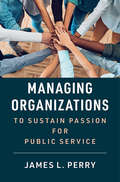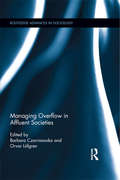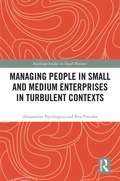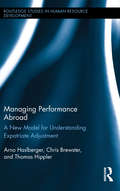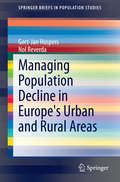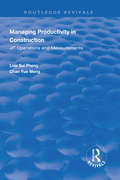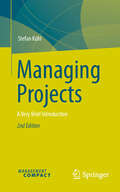- Table View
- List View
Managing Motivation: A Manager's Guide to Diagnosing and Improving Motivation
by Elissa Ashwood Robert PritchardThis slim motivation guidebook was written to bridge the gap between the academic research on motivation and to present it in a form that is useful to the practicing manager. In essence, the book presents a theory of motivation and how to use it without ever mentioning the word "theory". The goal of the book is to give managers a kind of mental model to use in thinking about motivation and to show them how to use this mental model for practical management actions to diagnose and improve motivation of subordinates. The book is written in three sections: Understanding Motivation, Diagnosing Motivation and Improving Motivation. The book incorporates case studies and many examples of how to successfully manage motivation.
Managing Multi-Dimensional Complexities in Organizations: From Problem-Solving to System-Optimization with the Dimensions Surfacing Heuristics (Systems Thinking)
by Mehaad A. TegallyPresenting a novel Systems Thinking methodology, this book serves as an essential guide to all those researching and practicing in a management, decision-making, or supervisory position who are facing multi-dimensional complex problems.The author presents critical systems thinking methods to address multi-dimensional complexities and deal with instability, uncertainty, and disruption. Complexities and perspectives are explained in simple terms to better understand the variety of influential factors of a complex situation, and meaningful insights into open-dynamic systems, their characteristics, purpose, and connections within the Eco-system, as well as thought-provoking behavioral ‘laws’ of systems, are presented. The author’s own tool “Dimensions Surfacing Heuristics” reveals and concurrently addresses the multiple dimensions of complex issues and paves the way to model its ideal state during system-optimization.The book is about seeing and understanding organizations as purposeful systems and about how to manage and optimize them. It will appeal to a scholarly audience across systems thinking, organizational studies, and management science as well as astute practitioners.
Managing Networks of Creativity (Routledge Studies in Innovation, Organizations and Technology)
by Udo Staber Fiorenza BelussiThe aim of the Managing Networks of Creativity is to improve our understanding of creativity and the management of creativity, as discussed in the fields of management (including strategic management, organization science, organizational behaviour, and entrepreneurship), economics, sociology, regional studies, and political science. While research on creativity has made several important contributions to the theoretical literature, little attention has been paid to the development and testing of formal theoretical models, especially in those cases where creativity is the result not so much of individual behaviour than the outcome of collective efforts, connecting individuals in organizations, social networks, projects, geographic clusters, and so forth. The proposed volume includes studies, both conceptual and empirical, which, as a whole, "deconstruct" the concept of creativity and the management of creativity by identifying specific situations, contexts, firms, clusters, and districts in which creative processes evolve. The reader is provided with in-depth discussions of theoretical issues and a range of descriptive cases and survey data that the authors use to explore or test concepts and models. Overall, the volume aims to integrate current debates concerning the role of creativity (and innovation) in economic and social development.
Managing Open Innovation Technologies
by Pär J. Ågerfalk Mikael Wiberg Jenny S. Eriksson Lundström Mats Edenius Stefan HrastinskiOpen innovation increases the profit of companies and organizations via the input and the adoption of new ideas that are transformed into new processes, products, and services. Yet, how do we ensure that adopters of such innovations focus on relevant problems and use appropriate methods? How should we manage open innovation technologies? How can we exploit distributed knowledge and inventions? And how can we promote them successfully on the market? With valuable lessons to be learned from academic research and industrial experiences of e.g. Intel, Nokia, Philips Healthcare, small municipalities, e-learning platforms and user communities, this book focuses on some of the key dimensions of open innovation and open innovation technologies. It is divided into three themes: theme 1 deals with open innovation as it is in use today, including theoretical underpinnings and lessons from related research fields. Theme 2 analyzes the use of open innovation in organizations today in order to extract best practices. Theme 3 presents forward-looking theoretical research as well as practical future uses of open innovation. Each chapter addresses the particular topics by presenting experiences and results gained in real life projects and/or by empirical research, and clearly states its purpose and how readers are supposed to benefit from it. Overall, the objectives of this book are to advance and disseminate research on systematic open innovation, and to make its results available to practitioners. Thus, the intended target audience includes the international academic community, industrial enterprises, and public authorities.
Managing Organisational Change
by S Ramnarayan V NilakantDrawing upon and integrating current theories, models, and experiences of companies in India and abroad, this book offers practical insights into managing change. It emphasises both what organisations need to change and how they should go about it. Examining primary data from about 50 progressive Indian organisations, the authors view organisational change in terms of three generic--growth; transformation and decline. Based on the case studies, they present a model of change that focuses on eight levers of change--value-based leadership, strategy, structure, human resource practices, technology, marketing, quality and costs. The model is richly illustrated with examples from both Indian and international practice. The authors examine the core values that must underlie any change effort and discuss the ways in which organisations can nurture value-based change. This timely and lucid book will be an indispensable reference or text for all behavioural and management programs.
Managing Organisational Success in the Arts (Routledge Research in Creative and Cultural Industries Management)
by David StevensonThe creative and cultural industries are a dynamic and rapidly expanding field of enterprise. Yet all too often the dominant narrative about arts organisations is one of crisis, collapse, and closure. This edited collection seeks to challenge that narrative through pursuing a focus on organisational success in the management of creative and cultural organisations. This book offers a robust and in-depth analysis of nine international case studies exploring how different organisations have achieved their objectives through effectively managing their resources. Spanning a broad cross section of the cultural sector including Theatres; Multi-Arts Venues; Performing Arts Companies; Museums and Galleries; and Festivals and Events, these cases highlight the importance of examining an individual organisation’s success in relation to its environmental context, revealing not only how arts organisations work in practice, but also providing inspiration and encouragement for those wishing to emulate such success. With an explicit focus on examining theory in practice, this unique collection will be of great interest to students, academics, and practitioners alike. While traditional approaches have often been overly theoretical, this pragmatic approach will help students to gain a richer understanding of how to manage cultural and creative organisations more effectively.
Managing Organizational Behavior in the African Context
by Constant D. Beugré David B. ZoogahManaging Organizational Behavior in an African Context discusses management and organization science theories as they apply within the social, cultural and economic contexts in which organizations operate in Africa. The first organizational behavior book to cover the entire continent, it uses the findings of OB studies to establish a conceptual foundation, then explores how those topics apply in Africa's unique business environment. This integrative framework allows students and scholars to connect organizational phenomena in Africa with those in other parts of the globe. Illustrative examples, mini-cases, and self-assessment exercises all based on Africa-specific sectors, industries, and organizations round out this foundational guide to the OB field in Africa.
Managing Organizational Change
by Helen CampbellA critical area of competitive advantage is the ability of organizations to lead rather than follow changes in the market. This means having the ability to roll out the right changes quickly and reliably in a way that delivers a return on investment. Managing Organizational Change brings together all the different roles and functions within an organization that a leader has to manage effectively to ensure successful and sustainable organizational change. Centred around the Cycle of Change Model, it provides a practical yet reflective overview of the four things you have to have (culture, capacity, commitment and capability) and the six things you have to do (direct, drive, deliver, prepare, propagate and profit). It explains which type of resources you need in order to achieve long term change, which tasks, roles and activities need to be in place and crucially, how to lead during a time of great unease. Managing Organizational Change will help you deliver better outcomes, reflect on what your organization needs to do better and ensure change is embedded throughout your organization.
Managing Organizational Change: Human Factors and Automation (Routledge Library Editions: Organizations)
by Fred FallikThe United States Internal Revenue Service introduced a multi-million dollar program to automate its operations in the early 1980s. This book describes a multidisciplinary study of the experiences of several thousand users in this program, based primarily on questionnaires, observation and interviews. The case study gives valuable guidance to managers and their consultants involved in planning introduction of new office technology, as well as providing more academic insights into aspects of human behaviour under changing working conditions.
Managing Organizational Knowledge: 3rd Generation Knowledge Management and Beyond
by Jr., Charles TryonOrganizations of all sizes and types are facing a duel threat and opportunity. At the very moment when global markets are becoming available, these organizations are losing valuable people resources due to "boomer" retirements and downsizing strategies. As the technologies arrive to facilitate knowledge sharing across organizational and people boun
Managing Organizations in the Creative Economy: Organizational Behaviour for the Cultural Sector (Discovering the Creative Industries)
by Paul Saintilan David SchreiberThe creative and cultural industries represent a growing and important sector in the global economy. Thriving in these industries is particularly tough and organizations face unique challenges in the digital age. This textbook provides a vivid initiation into the creative industries workplace. Managing Organizations in the Creative Economy is the first textbook of its kind, introducing organizational behaviour theories and applying them to the creative world. The text is underpinned by the latest research and theoretical insights into creative industries management and organizational behaviour, covering key topics such as structure, culture and the management of change and creativity as well as contemporary issues such as diversity, sustainability, managing stress, wellbeing and self-care, and remote working. The authors bring theory to life through practical examples and cases provided by industry experts, supported by specially created companion videos featuring managerial responses to the cases. This second edition textbook provides readers with an updated applied theoretical understanding of organizational behaviour that will be of particular benefit to those looking to work in the creative and cultural industries. Students on courses such as arts business, arts management and music business, and even students within the broader study of the entertainment and creative industries, will find this to be a vital read.
Managing Organizations in the Creative Economy: Organizational Behaviour for the Cultural Sector (Mastering Management in the Creative and Cultural Industries)
by Paul Saintilan David SchreiberThe creative and cultural industries represent a growing and important sector in the global economy. Thriving in these industries is particularly tough and organizations face unique challenges in the digital age. This textbook provides a vivid initiation into the creative industries workplace. Managing Organizations in the Creative Economy is the first textbook of its kind, introducing organizational behaviour theories and applying them to the creative world. The text is underpinned by the latest research and theoretical insights into creative industries management and organisational behaviour, covering contemporary issues such as business decision-making, ethics, and sexuality. The authors bring theory to life through practical examples and cases provided by industry experts, supported by specially created companion videos featuring managerial responses to the cases. This unique textbook provides readers with an applied theoretical understanding of organizational behaviour that will be of particular benefit to those looking to work in the creative and cultural industries. Students on courses such as arts business, arts management, music business and even the broader study of the entertainment industries will find this to be a vital read.
Managing Organizations to Sustain Passion for Public Service
by James L. PerryAlmost three decades ago, James Perry created the first survey instrument to measure public service motivation. Since then, social and behavioural scientists have intensively studied the motivating power of public service. This research relating to public service motivation, altruism and prosocial motivation and behaviour has overturned widespread assumptions grounded in market-orientated perspectives and produced a critical mass of new knowledge for transforming the motivation of public employees, civil service policies and management practices. This is the first study to look systematically across the different streams of research. Furthermore, it is the first study to synthesize the research across the applied questions that public organizations and their leaders confront, including: how to recruit ethical and committed staff; how to design meaningful public work; how to create work environments that support prosocial behaviour; how to compensate employees to sustain their public service; how to socialise employees for public service missions; and how to lead employees to engage in causes greater than themselves.
Managing Overflow in Affluent Societies (Routledge Advances in Sociology)
by Orvar Löfgren Barbara Czarniawska“It is simply too much” is a common complaint of the modern age. This book looks at how people and institutions deal with overflow - of information, consumption or choices. The essays explore the ways in which notions of overflow – framed in terms of excess and abundance or their implicit opposites, scarcity and dearth – crop up in a number of contexts such as sociological and economic theory, management consulting, consumer studies, and the politics of everyday life. Chapters range from studies of overload at home, at work or in the world of cyber information; strategies of coping with overflow in institutions such as news agencies; and historical comparisons. When, where, how and for whom is overflow a problem or a blessing?
Managing People in Projects for High Performance: Behavioural Approach to Productive Project Teams (Management for Professionals)
by Upasna A. Agarwal Karuna Jain Vittal Anantatmula Sankaran ShankarThis book examines practically useful management and people skills, and looks at competencies from the micro, meso, and macro- lens. At the micro- level, the book examines a range of competencies needed for managing oneself and others in a project environment, such as personality style, cognitive skills, communication skills, and emotional intelligence. The book will also includes discussion on strategies for managing emotions of self and others effectively. At the meso- level, the book discusses basic structure, characteristics, and importance of different types of teams such as virtual teams, project teams, domain specific teams, and heavy-weight teams in organizations to enhance productivity and delegate accountability. It also explores team processes, including structure, culture, supporting systems, performance and incentive systems, and their impact on team productivity. In addition, the book includes a discourse on skills to manage a multi-generational workforce (a combination of baby boomers, X and Y generation), a challenge faced by project managers in current scenario. Finally, at the macro- level, the book captures the role of culture in a project context; emerging leadership styles in projects, maintaining relationship with internal and external stakeholders; role of power, politics and influence in relationship building (social networks and social capital); and managing conflicts and negotiations. The book presents ethical considerations in managing projects; relationship between projects and sustainability; societal responsibilities of projects; advantages and disadvantages of forms of control in projects (behaviour and outcome control). It is positioned primarily for practitioners although it is a relevant and useful resource and reference for academics and students of project management and management studies courses.
Managing People in Small and Medium Enterprises in Turbulent Contexts (Routledge Studies in Small Business)
by Alexandros Psychogios Rea ProuskaManaging People in Small and Medium Enterprises in Turbulent Contexts explores a range of human resource management (HRM) issues specific to small and medium-sized enterprises (SMEs). Based on a series of research studies and secondary sources of data, the book’s primary aim is to contextualise HRM issues in SMEs operating in a variety of national economic contexts that are (or have recently experienced) a turbulent situation. SMEs are the backbone of these economies. It is therefore critical that we study HR practices and concepts within such enterprises. The book covers HR practices in SMEs, such as recruitment and selection, training and development, performance evaluation and employee relations, by focusing on three types of turbulent economies: emerging market economies in Asia, the Pacific, Africa and Latin America; transition economies of Central and Eastern Europe; and crisis contexts in Southern Europe. Managing People in Small and Medium Enterprises in Turbulent Contexts is a useful resource for organisations, practitioners, academics and scholars in the fields of HRM, employee engagement, small and medium business management and other related disciplines.
Managing Performance Abroad: A New Model for Understanding Expatriate Adjustment (Routledge Studies in Human Resource Development)
by Thomas Hippler Arno Haslberger Chris BrewsterIn a global economy full of multinational firms, international human resource management (including expatriation, career management, and talent management) is a growing topic in the business and management literature and in universities. A thorough understanding of the adjustment of expatriates to their new environment is critical not only for selection and preparation of potential expatriates, but also for the management of expatriate performance. Managed well, expatriates can be key contributors to organizational success while abroad and even after repatriation. Poor understanding and management of expatriate issues, on the other hand, may lead to underperformance and increased turnover of expatriates and repatriates. Managing Performance Abroad summarizes and extends what is known about the topic of expatriate management and adjustment, covering all the major authors and presenting a new approach to the adjustment process. At present, expatriate adjustment is only covered as a chapter in books on international HRM and HRD. Much of this literature relies on outdated concepts and evidence. Furthermore, most business research and management publications use an expatriate adjustment model that was originally published about two decades ago. This book is the first dedicated solely to the subject of expatriate adjustment, enabling readers to formulate research questions and hypotheses and to develop expatriation policies and support systems that optimize the performance of expatriates. It presents a re-formulation of the model underlying management research about expatriate adjustment, providing guidance for researchers and practitioners alike.
Managing Political Change: Social Scientists And The Third World
by Irene L. GendzierFor nearly three decades, policymakers and students have been concerned with Third World societies in transition. Conventional interpretations of political change, formalized in studies of political development, have dominated approaches to analyzing such changes. Yet, argues the author, these interpretations have been justly criticized as bankrupt and irrelevant to Third World realities. Why are they reproduced? How can one explain the belief that these approaches remain viable? These are some of the questions addressed in this wideranging review of the literature of political development and the paradigms that have guided analysis of political change over the past thirty years. Examining how political development theories are rooted in U.S. foreign policy, domestic political trends, and changes in postwar political science, Dr. Gendzier grounds the traditional approach to political development in recent history and politics. Her analysis raises questions about how development doctrine is related to foreign policy, as well as noting development theory's debt to cold war ideology and revisionist theories of liberal democracy. Dr. Gendzier's interpretation sheds light on the reasons for the current theoretical bias that favors approaching politics in terms of psychology and culture—an approach that, she states, has had devastating effects on our understanding of politics.
Managing Politics at Work
by Aryanne OadeDo you want to acquire the knowledge and skills to give you greater influence in political situations at work? Perhaps you want to make sense of the political behaviour you see around you. Or maybe you want to acquire a set of effective tools to help you work more productively in a political workplace. If so, this book is for you.
Managing Population Decline in Europe's Urban and Rural Areas
by Gert-Jan Hospers Nol ReverdaThis book explores the challenges population decline presents for Europe's urban and rural areas. It features recent demographic data and trends not only for Europe as a whole, but also for selected countries, and compares growth and shrinkage from a historical as well as a theoretical perspective. In addition, the book critically reviews relevant notions from geography, sociology, and public administration. It also identifies good practices across Europe. Throughout, theories are complemented with concrete examples and proposals are made on how to tackle demographic shrinkage in European cities and villages, from attempts to attract new residents to the countryside to innovative ways to guarantee public services. In the end, the authors conclude that solving the challenges caused by population decline require novel ways of thinking and provide answers to such future-oriented questions as: how to ensure the quality of life in an environment that is inhabited by fewer and older people, what investments are needed, and which actors should be involved. Managing Population Decline in Europe's Urban and Rural Areas offers detailed coverage of an underestimated and complex governance issue that asks for solutions in which citizens have to play an important role. It concludes that shrinkage requires a rethink of the specific tasks and roles of government and presents a way forward based on initiatives currently underway throughout Europe. The book will be a valuable resource for population policy makers as well as students and researchers interested in human geography, urban planning, rural development, European studies, public administration, and other social sciences.
Managing Productivity in Construction: JIT Operations and Measurements (Routledge Revivals)
by Low Sui Pheng Chan Yue MengFirst published in 1997, this volume joined the debate assessing the potential of the Just-In-Time management philosophy from the manufacturing industry for Singapore’s construction industry by examining the "off-site" prefabrication of precast concrete components in Singapore, in comparison with traditional management systems. In the wake of the 1991 Strategic Economic Plan of Singapore, which forecasted alarmingly low productivity in the local construction sector, the authors noted that construction in Japan was 35% more productive, whilst Finland was 75% better. Highlighting immense potential for the JIT approach, they explore the JIT philosophy, traditional systems, construction wastes and comparisons between construction and manufacturing.
Managing Projects in Health and Social Care
by Vivien MartinManaging Projects in Health and Social Care is designed for anyone who is asked to manage a public services project but who lacks the experience or training to feel confident in this role. The book shows how to use project management techniques to ensure that your project will be successful. The key dimensions discussed are: * budget* time* feasibility* planning / scheduling* implementation* evaluation.The book includes many examples to show how people have used the techniques described in health and care settings. There are clear explanations of how and when to use each technique and consideration of the differences between large and complex projects and smaller, less complicated ones. It is a valuable resource for anyone who wants to be sure that their project will make a useful contribution to improvement of health and care services.
Managing Projects: A Very Brief Introduction
by Stefan KühlThe linear, goal-oriented approach to projects that is so popular in management literature is only appropriate if you are dealing with well-defined problems. For projects that address poorly defined problems, however, the principles of classic project management don&’t work; project managers attempt in vain to maintain a linear approach, even if targets, people affected and framework conditions cannot be determined precisely. We propose a fundamentally different approach based on current organizational theory: to start out with experiments, without predetermined conclusions. Projects are not evaluated by comparing the current status to the target, but rather by assessing whether stagnation has been overcome, conflicts put aside, and shared understanding about new opportunities has been created. Project groups and steering committees are not set up at all. Power &“games&” are harnessed and put to use, rather than prohibited.
Managing Protected Areas: People and Places
by Richard Clarke Niall Finneran Denise HewlettThis open access book brings together 16 specially commissioned chapters drawn from a range of different professional-practitioner and academic global perspectives on the importance of the relationship between people and green and blue spaces. It focuses on issues surrounding the importance of natural environments on public health and wellbeing, and the environmental, cultural, and social importance of green and blue spaces that can result through responsible and sustainable adaptive management processes. It explores how the Covid-19 pandemic forced reconsiderations of our relationship with these natural spaces and highlights the important impact of the pace of climate change. While not pretending to have the answers, the stimulating and imaginative contributions embrace rich perspectives drawn from backgrounds as diverse as heritage studies, tourism, conservation, geography, policy formulation, public health, environmental health, research methods, history, literature, art, and theology.
Managing Psychosocial Hazards and Work-Related Stress in Today’s Work Environment: International Insights for U.S. Organizations
by Ellen Pinkos CobbToday’s evolving world of work makes it imperative for employers to manage psychosocial hazards (PSH) and risks leading to work-related stress. This book contains essential, general and country-specific information and templates for the successful management of hazards so as to prevent psychological harm in the workplace. Acknowledged as global issues affecting all workers and industries, PSHs are work factors that have the potential to lead to physical or psychological injury and stress, relating to how work is designed, organized, and managed, and to work relationships and interactions. This book advances the idea that management of PSH and psychological health and safety is part of today’s responsible and ethical employers’ duty of care for employees, and that United States employers should recognize this responsibility. Easy to follow, this guide presents comprehensive information on addressing PSH, discussing measures taken internationally (laws, guidance, and resources from Europe, Canada, Mexico, Australia, and Japan), as well as a new global standard on psychological health and safety at work. Practitioners and students in the fields of management, occupational health and safety, human resource management, ethics and compliance, occupational health psychology, and organizational psychology will come away with a deeper understanding of the importance of PSH and their management.

